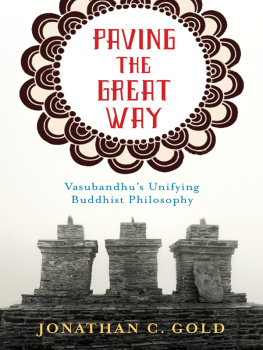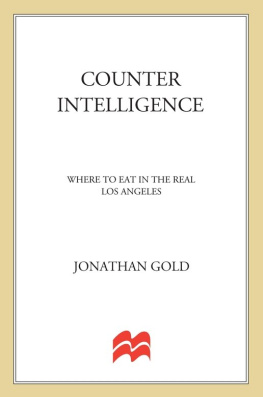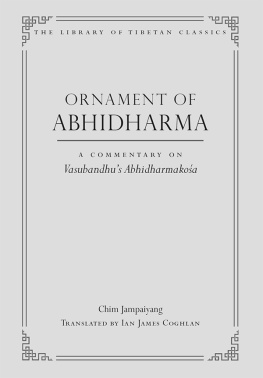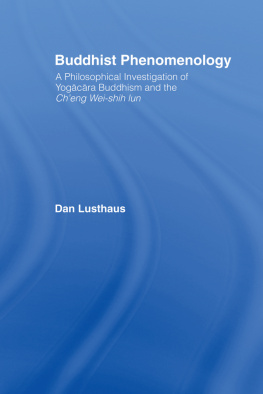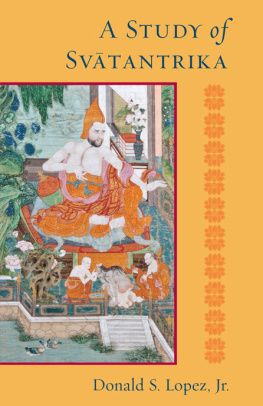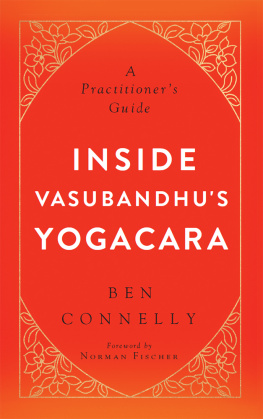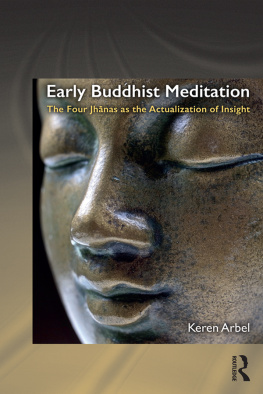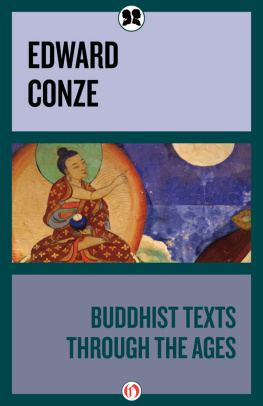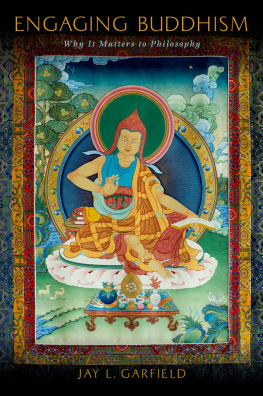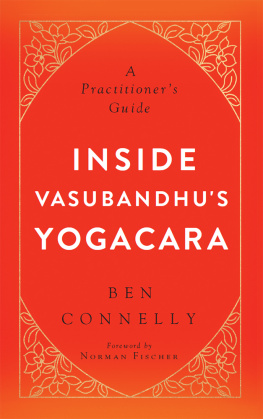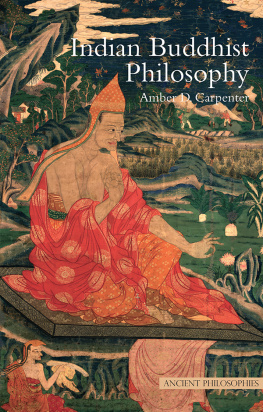PAVING THE GREAT WAY
VASUBANDHUS UNIFYING BUDDHIST PHILOSOPHY
Jonathan C. Gold
COLUMBIA UNIVERSITY PRESS
New York
Columbia University Press
Publishers Since 1893
New York Chichester, West Sussex
cup.columbia.edu
Copyright 2015 Columbia University Press
All rights reserved
E-ISBN 978-0-231-53800-8
Library of Congress Cataloging-in-Publication Data
Gold, Jonathan C., 1969- author.
Paving the great way : Vasubandhus unifying Buddhist philosophy / Jonathan C. Gold.
pages cm
Includes bibliographical references and index.
ISBN 978-0-231-16826-7 (cloth : alk. paper) ISBN 978-0-231-53800-8 (electronic)
1. Vasubandhu. 2. Buddhist philosophy. I. Title.
BQ7529.V367G65 2014
181'.043dc23
2013043739
A Columbia University Press E-book.
CUP would be pleased to hear about your reading experience with this e-book at .
Cover design: Noah Arlow
References to websites (URLs) were accurate at the time of writing. Neither the author nor Columbia University Press is responsible for URLs that may have expired or changed since the manuscript was prepared.
For my parents
CONTENTS
M Y INTEREST in Vasubandhu was kindled during a Sanskrit reading course on Yogcra philosophy taught by Paul J. Griffiths at the University of Chicago Divinity School. The students sitting around that seminar tableespecially Mario DAmato, Richard Nance, Parimal Patil, Dan Arnold, and Trina Janiec Jonesbecame, and remain, crucial interlocutors for me. This book is only the latest of my attempts to explain myself to them, and over the years they have each read and commented on one or another version of the ideas in this book. I am grateful to them all. Dan Arnold deserves special gratitude for his careful attention to a recent draft. Matthew T. Kapstein, also at Chicago, has had an indelible influence on my education in Buddhist philosophy.
I am grateful for the opportunity to work in the collegial, supportive environment of the Department of Religion at Princeton University. Stephen Teiser, Jacqueline Stone, Jeffrey Stout, Judith Weisenfeld, Leora Batnitzky, and AnneMarie Luijendijk have been especially kind. The departments unmatched staffLorraine Fuhrmann, Patty Bogdziewicz, Kerry Smith, and Mary Kay Bodnarmake the working environment here hum with efficiency and just plain fun.
What can I say about the many people who have contributed to my thinking for this book, either in private conversations or by providing comments and evocative questions after presentations? My gratitude, properly elaborated, would fill its own chapter, but fearing prolixity I provide only the root text: Charles Goodman, Christopher Morgan-Knapp, Khenpo Ngawang Jorden, Khenpo Lama Pema Wangdak, Dan Lusthaus, Christian Coseru, Florin Deleanu, Georges Dreyfus, John Dunne, David Eckel, Owen Flanagan, Jay Garfield, Padmanabh Jaini, Stephen Kaplan, Kristin Beise Kiblinger, Sara McClintock, Karin Meyers, Marlissa Moschella, Changhwan Park, Roy Tzohar, Jan Westerhoff, Marie Friquegnon, Douglas Duckworth, Funayama Toru, Tao Jiang, Andrew Nicholson, Bronwyn Finnigan, Tom Tillemans, Jonathan Ciliberto, Robert Wright, Rick Repetti, and Ram-Prasad Chakravarthi. Mark Siderits and Christopher Gowans each provided incisive, formalized comments. My brother, David Gold, has generously shared his time and his talents as a Sanskritist.
I apologize to those whose names I have neglected to include. And, of course, none of these people should be blamed for the failings of this work; I am not conditioned to follow all of the best advice.
I am grateful to Wendy Lochner and her colleagues at Columbia University Press for their interest, care, and attention to the manuscript.
Since 2011, I have been the beneficiary of Princeton Universitys Julis Foundation University Preceptorship, which has provided the rarest treasure, a luxurious extension of time (which turns out to have been necessary) to write, meet with colleagues, and complete this manuscript.
Sections 4.1 and 4.3 from my article Vasubandhu, Stanford Encyclopedia of Philosophy, ed. Edward N. Zalta (, and are reprinted here with permission.
This book is dedicated to my parents, with gratitude for their support. I also pause to thank my children, Etta and Milo, for being brilliant and true. To Heather: our love is not for public consumption, so I will only say thank you, again.

| AKBh | Abhidharmakoabhya (= Pradhan 1975; str 2008) |
| AKK | Abhidharmakoakrik (= verses selected from Pradhan 1975) |
| DhDhV | Dharmadharmatvibhga (= Mathes 1996) |
| DhDhVV | Dharmadharmatvibhgavtti (= Mathes 1996) |
| KSP | Karmasiddhiprakaraa (= las grub pai rab tu byed pa; Derge Tanjur 19821985; vol. 136 [shi]: fols. 134v145r) |
| LVP | La Valle Poussin |
| MAV | Madhyntavibhga (= Nagao 1964) |
| MAVBh | Madhyntavibhgabhya (= Nagao 1964) |
| MNS | Mahnidna Sutta (= Walshe 1995b; see also Thanissaro 1997a) |
| MSA | Mahynastrlakra |
| MSABh | Mahynastrlakrabhya |
| MSBh | Mahynasagrahabhya |
| NBh | Nyyabhya (= Jha 1939) |
| PSP | Pacaskandhaprakaraa |
| SNS | Sadhinirmocanastra (= Lamotte 1935) |
| SPS | Smaaphala Sutta (= Walshe 1995a; see also Thanissaro 1997b) |
| Tri | Triik (= Lvi 1925) |
| TSN | Trisvabhvanirdea (= La Valle Poussin 1933) |
| Vi | Viatik (= Lvi 1925) |
| VyY | Vykhyyukti (= Lee 2001) |
T HIS BOOK is a study of the philosophical work of Vasubandhu, a fourth/fifth-century Indian monk who was perhaps the greatest Buddhist philosopher after the Buddha. Vasubandhus works are well known in Indian, Tibetan, and East Asian Buddhist traditions. From his time to this day, and without a break, his writings have been widely cited and commented upon, his arguments used and debated, and his accomplishments praised. He is a familiar figure in contemporary Buddhist studies as well. His works have been a constant topic of investigation and translation for more than a centuryincluding being the subject of one of the signature accomplishments in the field, the copiously annotated French translation by Louis de La Valle Poussin, from Xuanzangs Chinese translation of Vasubandhus Abhidharmakoabhsya, published between 1923 and 1931. Everyone knows Vasubandhu. What is remarkable, then, is that we do not, by now, know Vasubandhu very well.
We can list his attributed works, and recite his life story, but what exactly was his intellectual contribution? Unlike other Indian Buddhists of comparable statureNgrjuna, Asaga, Dignga, Dharmakrtihe is uniquely difficult to provide with a tag line. The reason for this is that, as any student of Buddhism knows, Vasubandhu did not stick to one tradition. He was the greatest systematic thinker in the Yogcra school of Mahyna thought, and he defended core Yogcra doctrines with arguments that are still worth our consideration. Yet before that, he was the greatest advocate for the non-Mahyna, Sautrntika interpretation of Abhidharma thoughta critic of extreme views advocated within the dominant non-Mahyna school of the time, the Kashmiri Vaibhika. And even before that, he was the author of the most concise and comprehensive synthetic summary of the Vaibhika tradition itself. Thus, he can be labeled with three distinct scholastic identitiesVaibhika, Sautrntika, and Yogcranone of which applies to the full body of his work. Whats more, his contribution to each was unique.

